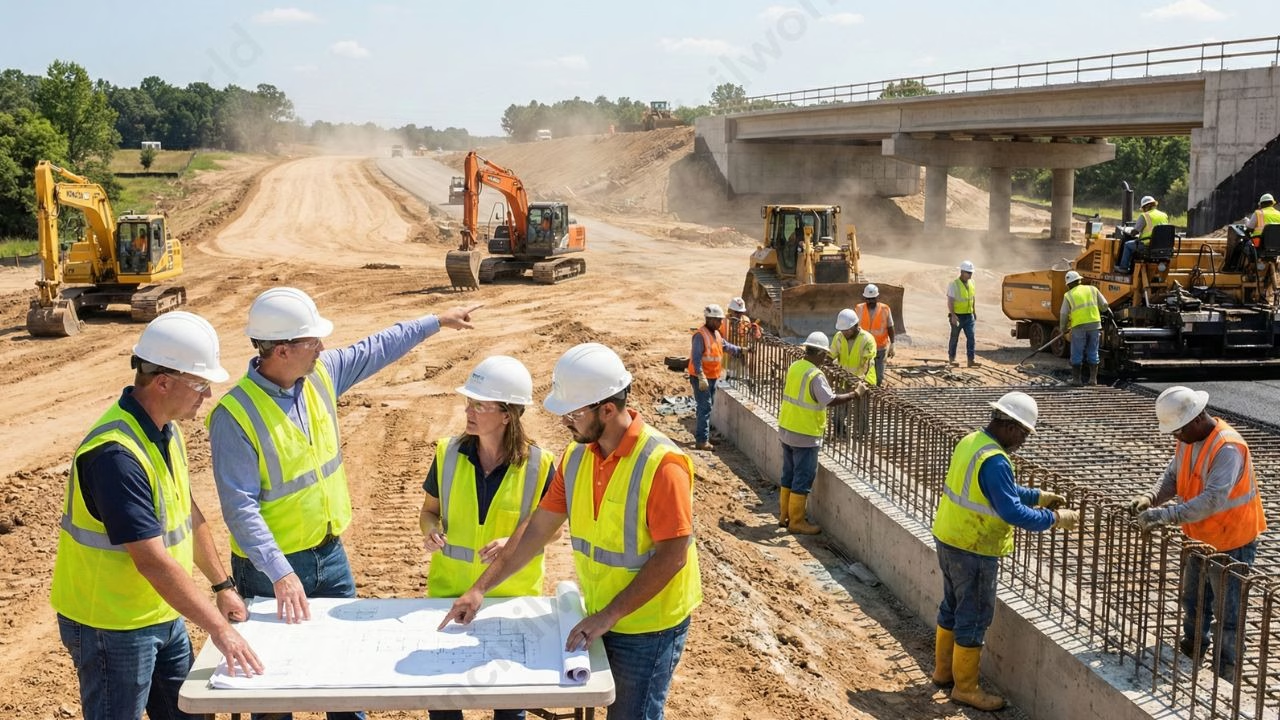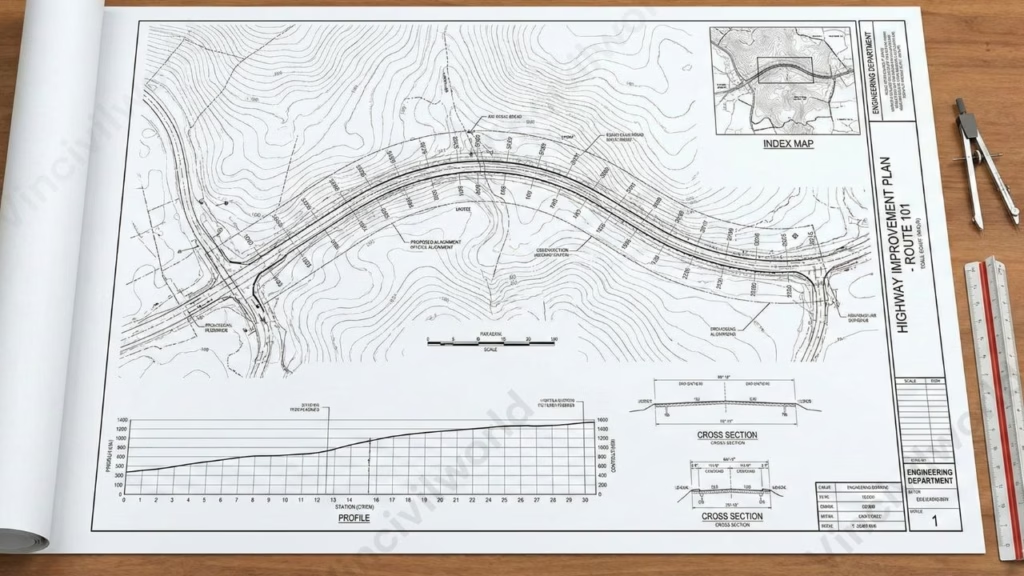Highway engineering is the branch of civil engineering that oversees the planning, design, construction and maintenance of roads and highways , a critical discipline enabling modern infrastructure. At its core, highway engineering ensures that road networks are safe, efficient, and durable, whether for local streets or major expressways. When readers ask “what is highway engineering” or seek a highway engineering definition, they find that it spans geometric road layouts, pavement design, drainage, and traffic-flow planning. Understanding the importance of highway engineering becomes clear when you realize how it supports trade, mobility, and national development by facilitating swift movement of people and goods. A dedicated section on highway engineering construction shows how design transforms into physical roads that serve communities and economies.
In this article, we will also explore what highway engineering entails, its key components, and its significance in modern infrastructure. We’ll also delve into the essential aspects of road and highway engineering. We will highlight its importance in the development of safe and efficient transportation systems.
Table of contents
What is Highway Engineering ?
Highway engineering is a specialized branch of civil engineering that deals with the planning, design, construction, and maintenance of highways and road networks. When we ask about the definition of highway engineering, the answer includes everything needed to make roads safe, durable, and efficient for public use. This field covers pavement design, traffic control, drainage, and geometric alignment to ensure smooth vehicle movement. A clear highwhttps://vincivilworld.in/highway-engineering-definition-importance/ay engineering definition explains that it focuses on meeting transportation demands while reducing accidents and congestion. Engineers study soil conditions, materials, and environmental factors to build strong and sustainable roads. The ultimate goal is to create infrastructure that supports mobility and economic growth. Therefore, the importance of highway engineering remains vital for national development and community connectivity.

It plays a crucial role in ensuring the safety and efficiency of transportation networks. Understanding what is highway engineering involves recognizing its impact on daily travel and commerce. Highway engineering encompasses various aspects, including pavement design, traffic management, and environmental considerations. As a fundamental part of road and highway engineering, it addresses challenges related to traffic flow, safety, and sustainability. This makes it essential for the development of modern infrastructure.
It entails researching the following topics:
- Highway planning, location, and growth.
- The materials needed to build a highway.
- The performance of highway traffic and its regulation.
- Road drainage, etc.
Importance of Highway Engineering
The importance of highway engineering lies in its ability to build efficient transportation networks that allow safe and rapid movement of people and goods. It strengthens connectivity between regions, reduces travel time, and drives economic development. With proper knowledge of road planning, design, and construction, engineers create routes that support modern infrastructure demands and future growth. Well-designed road systems remain essential for national progress and improved quality of life.
The Importance of roads is summarised below.
- They provide transportation for people, commodities, raw materials, and other items to various parts of the world.
- In hilly areas, they are the only means of contact.
- Assists in the upkeep of law and order in a government.
Let’s talk a bit about the planning of highways in the next section.
Planning and Development of Highway Engineering
Planning and development focus on designing road networks that meet safety, efficiency, and environmental standards. By mastering the principles of HE, engineers can optimize road and highway projects. This ensures these projects accommodate current and future traffic demands. It also minimizes environmental and community impacts.
Highway planning involves predicting existing and potential traffic volumes on a road network. This prediction is crucial for the success of HE. It also forms a fundamental basis for highway construction. Highway engineers work diligently to anticipate and assess all potential civil consequences of highway systems.
Environmental impacts are key considerations in road and highway engineering. Factors such as noise pollution, air pollution, and water pollution must be addressed, along with other ecological impacts.
What are Highway Plans?
In highway engineering, plans or drawings are essential documents. They are created from data obtained during various surveys aimed at locating a highway. These plans include the main map, index map, preliminary survey plans, and other sketches related to the road project. Detailed plans for additional works like bridges, culverts, and railway crossings are also prepared.
Purposes and Objectives of Highway Plans:
- To understand how the highway will function.
- To estimate the cost of the road project.
Now, let’s explore the construction phase.
Construction of Highways: Key Aspects
Understanding what is highway construction is vital for ensuring that highways can handle traffic demands and minimize environmental impact. The following are the key aspects of construction of highways.

- Planning and Design: In highway engineering, careful planning and design are crucial to ensure safety, efficiency, and durability.
- Site Preparation: The initial step in road and highway engineering involves clearing, grading, and preparing the site.
- Foundation Laying: Establishing a strong foundation is essential to support the road structure.
- Surface Construction: Laying the road surface, typically with asphalt or concrete, completes the construction process.
In most cases, extensive surveys and subgrade planning precede highway construction. There are many aspects of highway design that can be broken down into technological and commercial components.
The following are some examples of each:
Technological Components
Technological components in highway engineering include advanced construction machinery, GPS-guided equipment, and smart traffic management systems. These technologies enhance efficiency, precision, and safety in road and highway projects.
- Material quality
- Installation techniques
- Traffic
Commercial Components
Commercial components involve project financing, procurement of materials, and contract management. They ensure the economic viability of road and highway engineering projects by balancing costs, timelines, and resource allocation.
- Environmental considerations in contracts
- Aspects of politics and law
- Concerns from the public
Regardless of the project type, highway construction usually starts at the lowest elevation of the site and progresses upward. By looking over the project’s geotechnical requirements, we get an idea about the following:
- Current ground condition.
- Specific equipment requirement for excavation, grading, and material transportation to and from the site.
- Properties of material to be excavated.
- For below-grade work, dewatering requirement.
- Excavation safety criteria
- Quantities of water for dust control and compaction
How about the maintenance of highways? I will show you in the next section.
Maintenance of highways
The ultimate goal of highway maintenance is to correct flaws and maintain the structure and usability of the pavement. In order to construct an adequate maintenance plan, defects must be identified, recognised, and registered. Flexible and rigid pavements have different defects.
The four primary goals of highway maintenance are as follows:
- Repairing functional pavement defects helps to prolong the pavement’s functional and structural life.
- Ensure road protection and signage.
- Keep the highway in a usable state
- Highway systems and all of their components can be kept in initial, as-built condition by following routine maintenance procedures.
Last, but not the least a bit about the safety.
Highway Engineering Safety
Highway engineering safety is important since it involves the life of people. Automated traffic signals can be used to further ensure this.
- Safety management is a comprehensive approach to reducing the frequency and severity of traffic incidents.
- The key to improving highway safety is to design, develop, and maintain highway structures. These structures need to be much more tolerant of the average range of man/machine interactions with highways.
- Over time, technological advances in highway engineering have enhanced the methods used in design, construction, and maintenance.
Key Takeaways
- Highway engineering focuses on the planning, design, construction, and maintenance of roads, ensuring safety and efficiency.
- This discipline spans aspects such as pavement design, traffic management, and environmental considerations, impacting daily travel and commerce.
- Highway engineering plays a crucial role in national development by facilitating rapid movement of people and goods.
- Key components of highway engineering include effective planning, site preparation, construction, and maintenance for optimal road performance.
- Continued innovation in highway engineering is essential to meet growing transportation demands and enhance economic growth.
Conclusion
In conclusion, highway engineering plays a central role in shaping safe, durable, and efficient road networks that serve communities and industries. By understanding what is highway engineering and applying every aspect of HE construction, engineers ensure that roads remain reliable for heavy traffic and long-term use. A clear highway engineering definition highlights its wide scope, covering planning, design, and maintenance to support modern mobility. The importance of highway engineering is seen in better connectivity, faster travel, reduced transportation costs, and overall economic growth. As populations expand and transportation demands increase, the profession will continue to innovate with smarter designs and sustainable technologies. Strong highways are essential for national development, and this discipline will always remain vital for progress.






I recently had the good fortune of reading your article regarding “HIGHWAY ENGINEERING- DEFINITION, IMPORTANCE AND CONSTRUCTION DETAILS”. It was well-written and contained sound, practical advice. In fact, you pointed out several things that I will remember for years to come. I look forward to reading your next informative work. you can also check my article on Click here for more information.
Thank you.